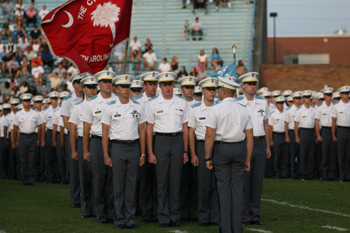The 100th Season of Citadel Football
 Bulldog Football Marks 100 Seasons
Bulldog Football Marks 100 Seasons
It started in the fall of 1905 in Hampton Park, probably on a clear Saturday afternoon, when The Citadel’s Sidney Smith sent the football team out to play a game against Porter Military Academy.
That contest concluded in a scoreless tie, but from all accounts, college football was first introduced to the Lowcountry and a tradition was born. That tradition, now called “Citadel Football,” has endured. The Bulldogs begin playing their 100th season of football in 2007 with their hallowed stadium – not Hampton Park – under a revitalization project … again.
The Bulldogs completed that first season of play with a 2-3-1 record, beating Porter twice, dropping a one-point contest to Welch Neck High School, and losing the final two outings, including a 47-0 whipping from the University of South Carolina in downtown Charleston.
The next season in 1906, The Citadel went unbeaten at 6-0 and un-scored upon, defeating College of Charleston, 23-0, Mercer 10-0, and Porter Military Academy, 10-0 and tieing the Charleston Amateurs, 0-0 and then beating them twice by a score of 5-0 both times.
That may have been the first time someone said, “Wait ‘til next year.”
The Saturday afternoon football-playing tradition continued and grew, and after The Citadel enjoyed a 7-3 season in 1926 playing at Hampton Park, then-Charleston mayor Thomas Stoney felt that The Citadel needed their own place to play football and had the city of Charleston build Johnson Hagood Stadium.
The facility got its first facelift in 1948 to the tune of $600,000, and became a showcase for the Lowcountry and Citadel Football. Scores of generations have since entered the facility to see the Bulldogs play.
And play they did. The Bulldogs have fielded a football team every year except during the World War II years and now embark on their 100th season of play.
Only twice has The Citadel captured the Southern Conference championship, in 1961 and 1992. But winning – albeit important – became secondary to the entertainment value to the local citizens and the growing number of alumni across the region.

The Citadel is one of the few colleges in America where their entire student body marches onto the field before the game.
Today, Johnson Hagood Stadium, although undergoing a makeover in phases (we’re currently in phase three of four), still hosts exciting Citadel games. However, it is the on-going memory of attending those contests with family, friends, classmates and neighbors that help make The Citadel’s 100th season significant.
To help spur the excitement, The Citadel installed last year a million-dollar scoreboard to help inform, entertain and promote as part of the Phase III project. But diehard football fans want to see a quality product on the field, and third-year coach Kevin Higgins and his staff are currently providing that having closed the gap on the league’s strongholds.
The games are exciting but some feel the pageantry of Citadel football is better. Sure, the tailgating has evolved into a sport of its own, but it is the overall atmosphere of Citadel football that has people excited.
The Citadel is one of the few colleges in America where their entire student body marches onto the field prior to the game. For more than half a century, those living downtown could always tell when the Bulldogs scored because of the cannon fire. Watching and hearing the Corps of Cadets sing “Hey, Baby” in the second half is a favorite of many, and it isn’t uncommon to see Spike, the Bulldogs’ Muppet-like mascot, carried on the Corps’ shoulders all the way to the top of their section.
And don’t forget those lovable live bulldog mascots that roam the sidelines, barking at opponents and referees alike.
This year, The Citadel has unveiled a new 100th season logo that will appear on the playing field, on banners around the stadium, on merchandise and on all publications. It was designed to help celebrate one of the Lowcountry’s longstanding gems, that of enjoying Citadel football.
The Bulldogs take on cross town rival Charleston Southern University at 2 p.m. Saturday, Sept. 1 at Johnson Hagood Stadium.
Story by Associate Athletics Director/Communication – Andy Solomon – 29 August 2007
Updated by John Carlisle – President of the CFA
